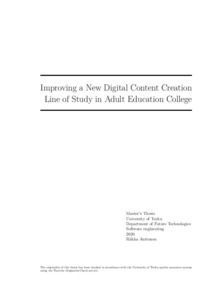Improving a New Digital Content Creation Line of Study in Adult Education College
Anttonen, Riikka (2020-06-16)
Improving a New Digital Content Creation Line of Study in Adult Education College
Anttonen, Riikka
(16.06.2020)
Julkaisu on tekijänoikeussäännösten alainen. Teosta voi lukea ja tulostaa henkilökohtaista käyttöä varten. Käyttö kaupallisiin tarkoituksiin on kielletty.
avoin
Julkaisun pysyvä osoite on:
https://urn.fi/URN:NBN:fi-fe2020062245259
https://urn.fi/URN:NBN:fi-fe2020062245259
Tiivistelmä
The topic of the research is digitalization and digital competence frameworks and
competence in the digitalized world and programming. Research methods in the
thesis are the qualitative research, the review of literature and case study. Used
methods in case study are interviews, questionnaire and observation. Research
group in the case study are the new Digital Content Creation line of study
students. The new Digital Content Creation line of study was designed according
to the Digital Competence Framework 2.0 from European Commission. With the
questionnaires, students evaluated their digital skills in the beginning of the studies,
in the middle of the study year and at the end of the studies. Review of literature
was made in researching digitalization and digital frameworks and competence in
digitalization and programming. The goal of the action research process was to
improve the Digital Content Creation line of study curriculum and programming
teaching. According to interviews, the students think that their digital skills have
improved very much during the study year. Students have gained good basics to
begin to learn more about programming. As a conclusion according to the research
and the case study, basic civic skills that everyone should master are determined.
Determined skills are: understanding technology, digital tools, privacy and security,
communicating through digital technologies, problem solving, updating digital
skills, computational thinking, searching and filtering digital information and giving
specific instructions.
competence in the digitalized world and programming. Research methods in the
thesis are the qualitative research, the review of literature and case study. Used
methods in case study are interviews, questionnaire and observation. Research
group in the case study are the new Digital Content Creation line of study
students. The new Digital Content Creation line of study was designed according
to the Digital Competence Framework 2.0 from European Commission. With the
questionnaires, students evaluated their digital skills in the beginning of the studies,
in the middle of the study year and at the end of the studies. Review of literature
was made in researching digitalization and digital frameworks and competence in
digitalization and programming. The goal of the action research process was to
improve the Digital Content Creation line of study curriculum and programming
teaching. According to interviews, the students think that their digital skills have
improved very much during the study year. Students have gained good basics to
begin to learn more about programming. As a conclusion according to the research
and the case study, basic civic skills that everyone should master are determined.
Determined skills are: understanding technology, digital tools, privacy and security,
communicating through digital technologies, problem solving, updating digital
skills, computational thinking, searching and filtering digital information and giving
specific instructions.
Samankaltainen aineisto
Näytetään aineisto, joilla on samankaltaisia nimekkeitä, tekijöitä tai asiasanoja.
-
Small businesses digitalization and territorial attractiveness : how can technology companies’ support for small businesses digitalization impact the territorial attractiveness?
Beuzelin, Pauline (23.06.2019)Digitalization becomes a requirement to succeed in the dynamic changing world. Small and Medium Enterprises (SMEs) are essential for delivering a more inclusive globalization and growth. However, many SMEs owners consider ...suljettu -
Small and medium-sized (SME) companies are not investing in digital tools and IT – why? : A research into SME digital tools and IT adoption factors
Matintupa, Johannes (Turun yliopisto, 04.06.2018)Prior research and media coverage over recent years have stated that small – and medium-sized companies (SMEs) are lagging behind in digitalisation and the adoption of digital tools and IT. This master thesis research ... -
STOP! In the name of Article 17 – An analysis of Article 17 of the Directive on Copyright in the Digital Single Market as a solution to protect copyright in the digital environment
Manninen, Pamela (22.10.2019)The protection of copyright-protected subject matter in the digital single market has been topical within the EU policy discussions during the recent years. Digitalization enables great possibilities, but also worrisome ...suljettu
